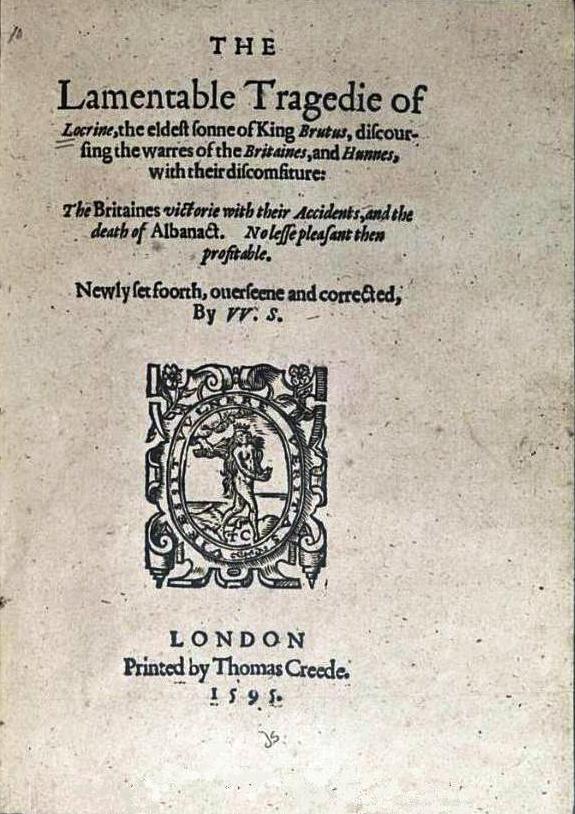Locrine
Locrine is an Elizabethan play depicting the legendary Trojan founders of the nation of England and of Troynovant (London). The play presents a cluster of complex and unresolved problems for scholars of English Renaissance theatre.

Date
Locrine was entered into the Stationers' Register on 20 July 1594 and published in 1595 in a quarto issued by printer Thomas Creede. Individual scholars have proposed dates for the play from the early 1580s on; many have favored a date c. 1591, based on the play's links with other works of the era. It has been argued, for example, that Locrine borrows from the Complaints of Edmund Spenser, published in 1591, and from The Complaint of Elstred, a poem by Thomas Lodge, written c. 1591, that circulated in manuscript before its first printing in 1593. The question of the play's date is complicated by the question of its authorship; if Charles Tilney was the play's author (see below), it must date prior to Tilney's death in 1586.
Authorship
The title page of the 1595 quarto advertised the play as "Newly set foorth, overseene and corrected, / By W. S." An identification of "W. S." with William Shakespeare apparently led to the play's inclusion among the seven works that Philip Chetwinde added to the second impression of his Shakespeare Third Folio in 1664 – which in turn led to the inclusion of Locrine in the Shakespeare Apocrypha. The play's stiff, formal verse is un-Shakespearean – but the extant text of Locrine does show evidence of revision. Some commentators have accepted the possibility that Shakespeare might have performed a revision – while others have rejected the idea. The authorship of the original play has been assigned to several dramatists of the era, with George Peele and Robert Greene being the two most common candidates.
A manuscript note found in a copy of the 1595 quarto, and apparently by Sir George Buck, who was Master of the Revels under King James I from 1609–22, states that his cousin, Charles Tilney, was the author:
Char. Tilney wrot[e a]
Tragedy of this mattr [which]
hee named Estrild: [which]
I think is this. it was [lost?]
by his death. & now s[ome]
fellon[possibly fellou] hath published [it.]
I made du[m]be shewes for it.
w[hi]ch I yet haue. G. B.
(The note is trimmed along its right edge, obscuring some words.) Samuel A. Tannenbaum disputed the authenticity of the note, claiming it was a forgery, probably by John Payne Collier, but it has been demonstrated that the handwriting is genuine. If Charles Tilney wrote the play, it must date before his 1586 execution for participation in the Babington Plot. There is no evidence, however, that Charles Tilney did any dramatic writing, other than his alleged connection with Locrine.









0 comments
Sign in or create a free account